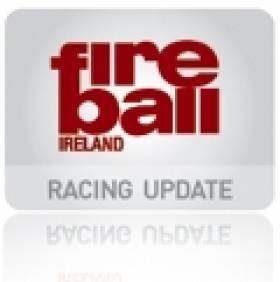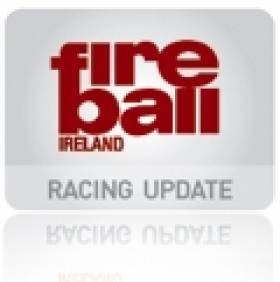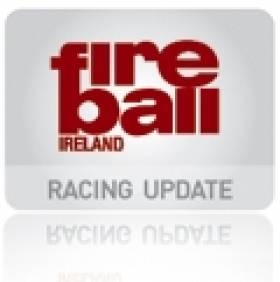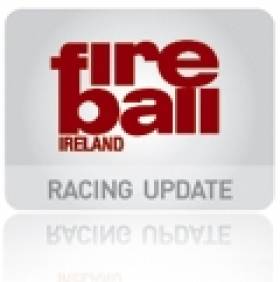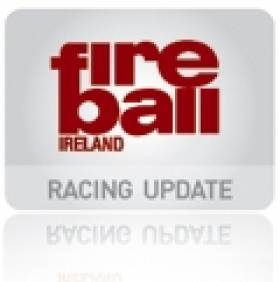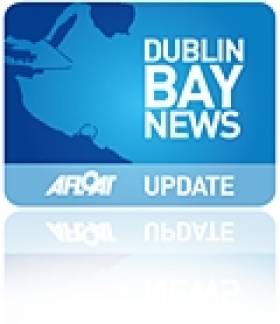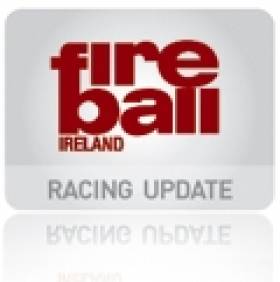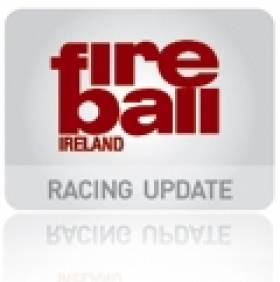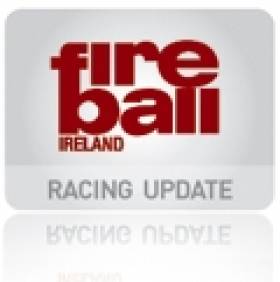Displaying items by tag: Fireball
Double Bonus for Dun Laoghaire Fireballs At DMYC Frostbites
#fireball – The Dun Laoghaire Frostbites got back on track today, Sunday 25th January, with two races in weather conditions which were also a bonus. As far back as Thursday the suggestion was that it would be blowing hard today. The Sea Area forecast from Met Eireann last night was also suggesting it would be “draughty” and lastly, the “Windfinder” App was suggesting that there would be as much as 18 knots at 15:00, this afternoon. In the end, none of them were right as the Frostbite fleet enjoyed good but challenging wind conditions in mild temperatures just into double figures. The weather station close to my vantage point was suggesting that winds of between 4 and 6 knots were blowing with gusts that got up to 12 knots. Directionally, there was some agreement on all the forecasts with a direction of SSW to SW being predicted and recorded.
In the first Fireball start the majority of the fleet were at the committee boat end but Neil Colin and Margaret Casey (14775) were at the opposite end and that certainly appeared to be the side that was favoured going up the beat. Those boats that hung out right were punished as they found themselves over-standing the first weather mark of the trapezoid course.
For a change, rather than attempt a blow by blow account of the race, the roundings of the weather mark on each of the four laps is recorded to give readers an idea of the “yo-yo-ing” that afflicted the fleet today.
|
Weather Mark Roundings |
1 |
2 |
3 |
4 |
|
Rumball & Byrne |
2 |
1 |
1 |
1 |
|
Butler & Oram |
7 |
3 |
3 |
5 |
|
McCartin & Kinsella |
3 |
4 |
4 |
2 |
|
Colin & Casey |
4 |
5 |
6 |
4 |
|
Miller & Murphy |
6 |
7 |
5 |
6 |
|
Clancy & Clancy |
1 |
2 |
2 |
3 |
|
Malcolm & O’Reilly |
5 |
8 |
8 |
7 |
|
McKenna & O’Keeffe |
9 |
6 |
7 |
9 |
|
Chambers & McGuire |
8 |
9 |
9 |
8 |
|
Smyth & Fisher |
10 |
10 |
10 |
10 |
Initially the off-wind legs of seemed to be quite simple. The top leg of the course, 1 – 2, was a tightish reach which most people three-sailed for the first couple of laps, but as the afternoon progressed this became a tighter leg and at least one Fireball sailed it as a two-sail reach and didn’t appear to lose out as a consequence. The leg from 2 – 3 was also simple enough initially, ease sheets as one rounded Mark 2 and sail to Mark 3, but on the last two laps of the trapezoid a variety of approaches were being adopted and Rumball & Byrne executed four gybes between 2 and 3 on the last lap before they went round the latter mark. The plan of attack for the beats was to stick to middle and left as going right did not pay at all. As the wind flicked one way and then another, the leg from 2 to 3 became ever more tactical and places could be snatched if you got into wind that those around didn’t have.
Frank Miller and James Murphy (14713) used this to launch a platform to attack the leaders and when the leading six boats appeared to concertina into the rounding of Mark 4 for the last time, they were able to take best advantage and pop out with a possible second place over the finish line.
As the finish was at the opposite end of the harbour to my vantage point, adjacent to the HSS gantry on the windward shore, my view of the finish was poor, but the suggestion is that the order was as follows;
|
DMYC Frostbites 2014/15 – Series 2 Round 2; 25th January. |
|||
|
1 |
Kenneth Rumball & Brian Byrne |
15058 |
INSC |
|
2 |
Frank Miller & James Murphy |
14713 |
DMYC |
|
3 |
Noel Butler & Stephen Oram |
15061 |
NYC/DMYC |
For the second race of the day, the Fireball fleet all started on port tack with the pin appearing to be the favoured end. Luke Malcolm and Harry O’Reilly (14790) were furthest away from the pin. Yet again the left-hand side of the course was where everyone wanted to be. At the weather mark the initial rounding order was Clancy, McCartin, Rumball, Butler and Colin and all five boats got a tight 3-sail reach as their reward. Again the fleet was able to ease sheets for the leg from 2 to 3 rather than gybe and as a testimony to the consistency of the breeze at this early stage the initial pecking order hadn’t changed by the time they got to Mark 3.
For the second beat the fleet went right with Rumball & McCartin keeping in very close company. Clancy was a little bit further to windward of this pair but he appeared to have lost some ground on them, meaning that despite the apparent close attention they were giving each other, he couldn’t capitalise on being the “third man”. At the second weather mark, Rumball was still in control and the leading three boats enjoyed a fast 3-sailer to Mark 2. 2 – 3 was no longer the simple leg it had been on the first lap and at the end of the leg McCartin had taken Rumball, Clancy was secure in third and Butler who though he was in fourth wasn’t anywhere near enough to get to the lead three boats.
Up the third beat and the lead two were watching each other again……..with Clancy waiting to pounce if they made a slip up. No joy! McCartin & Kinsella rounded the last weather mark in the lead but then nearly lost it all when a gust came through as they were putting up the kite. Rumball & Byrne must have seen a “literal door open and slam shut again” as the leaders escaped a swim and got control back again. As the two boats approached Mark 2 Rumball & Byrne were going faster and words could be heard between the two boats as Mark 2 loomed in front of them.
It seemed that all was “set fair” for a simple finish. The lead three boats negotiated their way to Mark 3 and for 2/3 of the leg from 3 to 4, the order seemed to be equally settled. However, even from my observation post on the opposite side of the harbour I could see that there was fun and games going on at Mark 4 – lots of overlapping spinnakers suggested that the leaders had closed in on themselves again. Rumball & Byrne got squeezed out, capsizing in the process (I found out later – from the “horse’s mouth) to leave a finishing order of Butler & Oram, McCartin & Kinsella and Rumball & Byrne.
In my estimation – without sight of the results – Miller & Murphy will pick up the Frostbite Mugs for the first race of the day, with Colin & Casey getting them for the second.
Fireball Frostbites Blown Out at Dun Laoghaire Harbour, Fireballers Race For Tasar World Title
#fireball – It will come as little surprise that yesterday's Frostbite racing at Dun Laoghaire was abandoned early in the day. While the sea state inside and outside the harbour weren't excessive, due to the Dun Laoghaire shoreline being the leeward shore, the wind conditions were severe and very gusty.
However, in warmers climes, a number of Fireballers have just concluded a Tasar World Championships in Australia, with commendable results.
In addition to 11th place overall, in a fleet of 122 boats, Heather picked up the Australian First Female Trophy (Highest placed woman helm).
On Saturday past, current Fireball World and European Champion, Tom Gillard and European Champion crew, Richard Anderton, won a "howling" Bloody Mary event in the UK.
And while the UK and Ireland is in the grip of high winds and the prospect of very low temperatures tomorrow (Tuesday), another regatta in warmer climes is being promoted inFacebook posts.
The Fireball North American Championships will be sailed as part of the 50th Anniversary North American Mid-Winters at Davis Island Yacht Club in Tampa, Florida, in mid March, 13th- 15th(for the Fireballs). They are also expecting some European involvement with a promise of two European Teams taking the roll-on-roll-off from Southampton to Florida and a Swiss crew have also made a commitment to the event.
The advice is that there is a substantial late entry fee for registration after January 31st, so if six days of Floridian sunshine is something that you can contemplate...........get cracking!
|
2015 Geographe Bay Tasar Worlds, Busselton, Western Australia. |
R1 |
R2 |
R3 |
R4 |
R5 |
R6 |
R7 |
R8 |
R9 |
Total (2 discards) |
|
|
11th |
Heather Macfarlane & Chris Payne |
25 |
4 |
4 |
16 |
12 |
17 |
5 |
15 |
9 |
65pts |
|
20th |
Conor Byrne & Michelle Mackie |
32 |
25 |
22 |
7 |
39 |
15 |
20 |
49 |
23 |
144pts |
|
23rd |
Ben Schulz & Cameron Philcox |
53 |
17 |
28 |
31 |
26 |
21 |
16 |
35 |
19 |
158pts
|
#fireball – Irish National Fireball Champions, Barry McCartin & Conor Kinsella (IRL15114) made their Frostbite debut in Dun Laoghaire yesterday and utterly dominated proceedings, leading from start to finish and putting three-quarters of a lap between themselves and the chasing pack at the finish writes Cormac Bradley.
Eight Fireballs initiated Series 2 of the Frostbites, hosted by Dun Laoghaire Motor Yacht Club and they enjoyed lighter and more fickle conditions than were forecast for the day. The Windfinder app was suggesting 12 knots of SSW, but the weather station adjacent to my observation position suggested that the base wind strength was around 6 knots with a highest recorded gust of 10 knots and a direction of 162˚. The air temperatures of the two systems – app and weather station – were consistent at 7˚. Still, after a gap of five weeks, with the last three Sundays of Series 1 lost to adverse weather, the fleet would have enjoyed being on the water in any conditions.
Again, I missed the start (New Year’s resolution – get there on time!) and arrived as a cluster of Fireballs rounded the first weather mark. Even after a single beat, McCartin & Kinsella had some distance on the fleet. They were followed by Alistair Court & Gordon Syme (IRL 14706), Noel Butler & Stephen Oram (IRL 15061) and Neil Colin & Margaret Casey (IRL 14775). A trapezoid course was the order of the day with a long beat and a shorter top leg between 1 and 2. The weather mark was set just off the ferry gantry with the committee boat anchored off the west pier.
For the second beat, McCartin & Kinsella took a short port tack hitch before setting off on a long starboard leg to the weather mark. What appeared to be a healthy lead on the water as they approached the mark seemed to evaporate, but it was an illusion because on time they were 45 seconds up on the next boat. Court & Syme were still in second place, followed closely by Louise McKenna & Joe O’Reilly (IRL 14691), with Colin & Casey, Butler & Oram, Frank Miller (IRL 14713), Louis Smyth & Glen Fisher (IRL 15007) and Mary Chambers & Brenda McGuire (IRL 14865) following on.
The leg between 1 and 2 stayed as a tight reach throughout the race and the bottom leg, 3 to 4 was likewise tight but the leg between 2 and 3 saw two different approaches being taken, continue on starboard tack towards the harbour mouth, or gybe and sail a slightly higher line to Mark 3. At Mark 4 the second time the fleet compacted, with the exception of the leaders who at this stage were in a “world of their own”. The tactic now appeared to be to tack earlier rather than later as the boats which went too far left found themselves in lesser breeze.
At Mark 1 for the third time, the lead was out to 2 minutes, the length of the leg between 1 and 2. The chasing pack seemed to have an established order with the sequence being Butler, Court, Colin, McKenna, Smyth, Chambers & Miller. However, for the balance of the race this group of seven had a persistent game of snakes and ladders before the finishing order was confirmed.
There were two elements to the beat now – stay in breeze and stay on starboard tack for as long as possible, taking the port hitch when the wind allowed. This meant that the fleet generally stayed inside the box created by the four marks of the course.
At the next rounding of the weather mark the sequence, apart from the leaders, who now had a two leg lead, was Colin, Butler, McKenna, Court, Miller, Chambers, Smyth. However, at Mark 3 they compacted again and in the process Chambers had the “door shut” on her, forcing her to drop spinnaker and tack to round the mark.
By the next rounding of the weather mark, Colin had got ahead of Butler, but his approach to the mark was interrupted by starboard tacked boats approaching the same mark. This allowed Butler to close but not pass Colin. McKenna and Court also rounded in close company followed by Smyth, Miller and Chambers, now slightly adrift due to her travails at the previous rounding of mark 3. By mark 2, Butler had taken Colin.
As the afternoon progressed, staying in wind became the primary challenge. On the last lap, Colin sailed on past mark 2 even though both McKenna and Court who had gybed at mark 2 seemed to have gained the upper hand on the water by this manoeuvre. However, he managed to sail “a circle route” to 3 and by staying in better breeze got his third place back again.
|
DMYC Frostbites 2014/15: Series 2, Round 1; 4th January 2015. |
|||
|
1 |
Barry McCartin & Conor Kinsella |
15114 |
RStGYC |
|
2 |
Noel Butler & Stephen Oram |
15061 |
NYC & DMYC |
|
3 |
Neil Colin & Margaret Casey |
14775 |
DMYC |
|
4 |
Louise McKenna & Joe O’Reilly |
14691 |
RStGYC |
|
5 |
Alistair Court & Gordon Syme |
14706 |
DMYC |
This result gave Barry & Conor the day’s Frostbite Mugs.
The DMYC clubhouse also hosted the prizegiving for Series 1 which had not taken place in December due to the last three races being abandoned due to adverse weather. DMYC Calendars were the prizes for the Series.
|
DMYC Frostbites 2014/15: Series 1, Overall (No discards). |
Pts. |
|||
|
1 |
Kenny Rumball & Brian Byrne |
15058 |
Irish National Sailing Club |
5pts |
|
2 |
Noel Butler & Stephen Oram |
15061 |
National Yacht Club & Dun Laoghaire Motor Yacht Club |
17pts |
|
3 |
Conor & James Clancy |
15113 |
Royal St. George Yacht Club |
21pts |
Kenny Rumball was not in attendance to receive his prize as he was in Australia returning the boat in which he finished seventh in Class and 12th overall (IRC) in the 2014 Rolex Sydney to Hobart Race. He raced with two other Irish sailors with strong Fireball connections – Barry Hurley and Kenny’s younger brother Alexander.
In other Irish Fireball related news, Conor Byrne was in 25th overall, after two races, in a fleet of 124 Tasars at their World Championships in Australia. Two other Fireball “connections” are also in action at this event; Chris Payne & Heather McFarlane were 15th overall after the same two races (and they won the Practice Race) and Ben Schulz was lying in 35th overall.
Fireball Dinghy Class Surveys Members Ahead of 2015 World Champs
#fireball – In 2014, the fleet at the Fireball UK Nationals were asked to complete a Survey Monkey poll (see attached word doc below) of the event writes Cormac Bradley. Among the subjects for consideration were, course configurations, race lengths, number of races per day, use of a leeward gate, location of the finish, line starts versus gate starts and time of prize-giving.
In terms of course configurations, two had been used at the Nationals, the conventional Olympic Course (triangle-sausage-triangle) and a new course sausage-triangle-sausage. As to be expected there were a variety of opinions offered on the merits of the two course types used and, as to be expected, reference was also made to the trapezoid course as well. The poll indicated that there was support for both configurations and a recommendation that the trapezoid not be abandoned altogether.
A choice of race durations was given in the poll – 45, 60 and 75 minutes – and the preference was for the shorter races unless the conditions were particularly enjoyable in which case a race of 60 minutes was the preference. Interestingly a number of respondents made the comment that more on the water finishes should be offered to the tail-enders – a feature we have been making use of for a number of years.
The poll is of interest to Irish Fireballers because the same issues are perennially debated at our events – particularly the number of races in the day. The preference from the UK Nationals poll is two or three – with three only preferred when either the wind is light or if the schedule for the regatta needs to be "caught up".
While the Irish Fireball Class would give their "eye teeth" for a 40+ boat Nationals, it makes for interesting reading to see what out next door neighbours have found from their members!
Irish Fireball Fleet Salute Season's Sailing Achievements
#fireballsailing – The Irish Fireball fleet gathered recently at the National Yacht Club to celebrate the 2014 sailing season, conduct post-mortems on the past twelve months and to recognise the achievers of the past year writes Cormac Bradley. Of course there were other reasons to get together – good company, good food and lots of camaraderie, or, to put it in Irish terms – "lots of craic".
As ever the event brought current Fireballers and "retired Fireballers" together to compare war stories from times past with those of the present!
In many ways 2014 had been an excellent year for the Irish fleet in that we had an Irish combination who made a very big impression on the international scene after a period in which we (as a fleet) weren't quite where we wanted to be. The same combination dominated the domestic scene, winning all five regattas of the year – a feat that I can't recall being achieved in recent years (though having made this statement I will no doubt be corrected).
In addition to recognising achievements on the water, the evening is also used to acknowledge those who allow us to race or help with the promotion of the Fireball Class here in Ireland and further afield.
Travellers' Trophy
The Travellers' Trophy is a season long points series that covers all five domestic regattas with points for each regatta awarded in accordance with the overall finish at the regatta. Thus first overall at each regatta gets a single point. The best four regattas are counted to the end of season title.
1. Barry McCartin and Conor Kinsella IRL 15114
2. Noel Butler and Stephen Oram IRL 15061
3. Kenny Rumball and crews IRL 15058
Barry & Conor swept all before them in terms of overall wins at the five regattas – Ulsters, Open Championships, Munsters, Nationals and Leinsters. They may not have won every race on the water but they proved to be very difficult to beat over a series of races. They won the Nationals with a race to spare and I can recall at least one other regatta where they won in the same style. The biggest comeback was recorded in Belfast Lough. On the Saturday, Butler & Oram had won two races, Rumball the third. McCartin was back in third overall. On the Sunday they won all three races to take the title.
In addition to taking the Travellers' Trophy, McCartin & Kinsella picked up the Class' ISA gold medals with the silver and bronze medals going to Messrs Butler & Oram (in absentia), Rumball & Byrne respectively.
Silver Fleet
The Silver fleet numbers haven't been quite what they have been in recent years and this year the winners are Mary Chambers and Brenda McGuire – IRL 14865.
Lady Helm
The Ladies are well represented in the Irish Fireball fleet with three all lady crews – Louise McKenna & Hermine O'Keeffe (IRL 14691), Cariosa Power & Marie Barry (IRL 14854) and the aforementioned Mary Chambers & Brenda McGuire (IRL 14865). Additionally, we have a leading crew in Margaret Casey (IRL 14775).
The leading lady helm of 2014 is Louise McKenna.
Both the Silver Fleet award and the Lady Helm awards are based on the Travellers' Trophy competition.
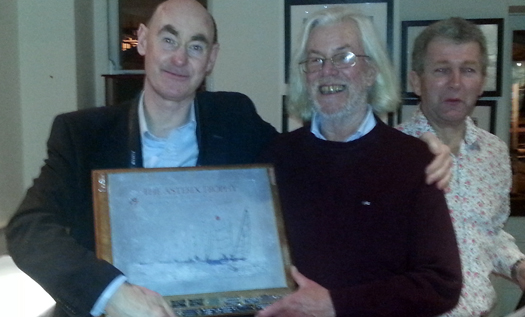
The Asterix Trophy
Awarded to an individual who is considered to have made a significant contribution to the Class, this year's winner was Bob Hobby. Bob has singlehandedly undertaken virtually every major or modestly major repair to the boats of the Irish Fireball fleet. So whether is it reconstructing a bow panel (Frank Miller), repairing trapeze hook puncture marks on the foredeck (Cormac Bradley/Louis Smyth) or simply keeping boats on the water by repairing minor holes and "dings", Bob is "yer only man"!
He also provides a mark-laying service over the winter months in the DMYC Frostbites Series, gives logistical support to his partner Louise McKenna in getting to regattas and is always on hand to lend a spare pair of hands to any task that needs to be done. It is a commitment that didn't just manifest itself in 2014 – it has been there for quite some time!
Bob's award of The Asterix Trophy came as a complete surprise to him, is well deserved and was hugely popular on the evening.
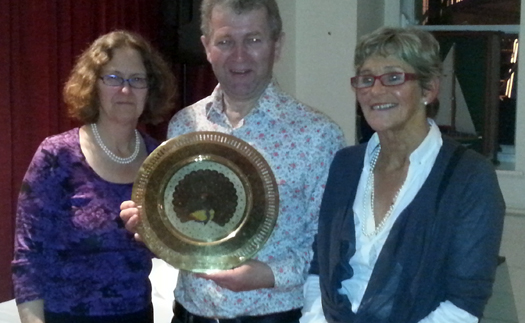
Mary Chambers (L) and Brenda McGuire (R) collect The India Trophy from Neil Colin. They also collected the Silver Fleet prize.
The India Trophy
Awarded to the "Most Improved" combination of the season, this year's recipients elevated their performance another notch this year after our annual coaching weekend, when we arrange to have a top UK Fireballer impart his knowledge to us. This year's coach was World Champion crew (From Slovenia 2013) – Simon Potts.
Mary Chambers & Brenda McGuire have had a good season – leading races and finishing well in Tuesday night DBSC races, doing well on DBSC Saturday afternoons and mixing it with the mid-fleeters at weekend regattas.
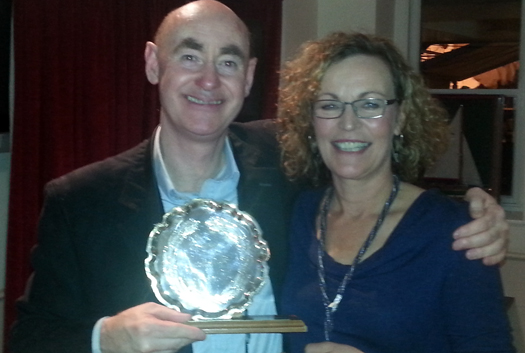
Frank Miller collects The Captain's Prize from Hermine O'Keeffe
The Captain's Prize
Donated a few years ago by "retired Fireballer" Frank Cassidy, who was present on the night, the "Captain" in the title is the Dun Laoghaire Class Captain. In 2014 the title of DL Class Captain is held by Hermine O'Keeffe, crew to Louise McKenna in IRL 14691, sailing out of the Royal St. George Yacht Club.
This year The Captain's Prize goes to Frank Miller who manages the Irish Fireball Association Facebook page, which now boasts 221 "likes" including Fireballers from around the World. As a photo-journalist (I'll get in trouble for that!) with The Irish Times, it seems rather fitting that Frank should get this award for Facebook reporting the activities of the Class.
The Liam Bradley Trophy
Donated by Cormac Bradley in memory of his father, the award criteria are discretionary – it may be awarded for excellence or for significant service or contribution.
This year, excellence was the award criteria and the recipients are Barry McCartin & Conor Kinsella.
In addition to winning the five domestic regattas, Barry & Conor went to Shetland and won the Shetland Nationals, a preamble to the 9-race Europeans where they finished 4th overall, a single point off the podium. They also won two races, the first and last of the regatta. Two weeks later at the 40+ boat UK Nationals they finished 5th overall. These are the best performances that Irish Fireballs have posted since La Rochelle in 2009, when if memory serves, Francis Rowan crewed Tom Gillard to 3rd overall in the Europeans. Tom is now Fireball World Champion.
Discretionary Awards
Two other awards were handed out on the night. Olivier Proveur was given a token of appreciation for his service in managing the DMYC Frostbite Series and fulfilling the role of Race Officer on many occasions over a long number of winters. This year he also "stepped into the breach" when Fireballers weren't able to do fulfil their line-duty commitments.
Conor & James Clancy were also recognised for consistent performance across all five domestic regattas – the worst spot of all – just off the podium, 4th in all five regattas.
Class Chairwoman, Marie Barry, was recuperating from a spell in hospital and was unable to attend the prize-giving. Immediate Past Chairman, Neil Colin (IRL 14775) was deputised to take on the role of MC – which he filled with aplomb, aided by a script prepared by Marie herself.
The National Yacht Club in Dun Laoghaire hosted the proceedings and served a very enjoyable two course buffet meal for a very competitive price, in a room for our exclusive use. An excellent way to close out the "summer season".
Big Winds Don't Deter INSS. No Racing, No Problem!
#inss – A blustery forecast and strong winds passing through Dun Laoghaire on Saturday night was not a good omen for the DBSC Turkey Shoot on Sunday morning. Indeed the code flags N over A were flying from the committee boat Freebird from as early as race skipper Alexander Rumball got to his boat, circa 9am writes Kenneth Rumball. What to do for our race training candidates on a Sunday morning was of course the next question?
Well, let's go sailing! Using our smaller fleet of dayboats, our modified Squibs, race training skipper Kenneth Rumball assumed the role as principal race officer, with Glyn Williams and Alexander Rumball assisting in coaching and mark laying. We had a few guests including Peter Hall and Noel Butler both who learnt to sail in the INSS but now race the 34.7 Adelie which also competes in the Turkey Shoot coming along to try their hand at racing in the squibs.
Laying a triangular course inside the harbour we had a visit from some of other competitors from the Royal St George who came out in a RIB to check were we okay as the conditions were quite rough to go sailing in.
We had three fantastic races with all crews beaming afterwards from having such a thrilling sail and in some cases clearing some sore heads from the antics of the night before!
A similar tale befell the DMYC Frostbite Series with racing also called off early due to the prevailing weather. Rather than bring our dinghy sailors out in the squibs, three of the INSS instructors, Kenneth and Alexander Rumball and Conor Corson took a Fireball dinghy and laser dinghy out for a spin. This activity was not just for fun but to show our junior sailors how to handle dinghies in the higher winds, using our new state fo the art 6.5m RIB, Glyn Williams brought 6 of our junior sailors out to watch both dinghies in action. A video of the day is available on the INSS youtube page.
A worthwhile and fun experience for instructors and sailors alike.
Seven Fireballs Line Out For DMYC Frostbite Dinghy Series
#fireballsailing – Seven Fireballers headed out to the bay on Sunday afternoon for race 5 of the DMYC Frostbite series, a race in the bay gave the fireballs a chance to stretch their legs on a longer course but with the spring tides in play, some tidal calculations were needed at all the turning marks of the course. Watching the PY fleet start before, it was clear a conservative start was needed and after waiting for our turn, all seven fireballs got away cleanly with no OCSs to mention, a rare time with Irish Fireballers.
Given the shifty conditions, the first beat was almost a fetch to the weather mark and most of the fleet tacked on to port almost instantly after the start, the Clancy brothers 15113 mastered the start line and took a dominant role on the left handside of the fleet. Neil Colin and Margaret Casey 14775 went out towards the right hand side while most of the fleet kept towards the middle of the course.
At the top mark, the Clancy brothers had held their lead and rounded first, followed by Colin/Casey, then Rumball/Byrne 15058 followed hot by Butler/Oram 15061. A quick hoist saw Rumball/Byrne overtake Colin/Casey on the top reach and then set off in hot pursuit of the Clancy brothers. By the first gybe mark of the trapezoid the Clancy brother still held their lead. Up the next beat Rumball/Byrne had closed the gap while Butler/Oram had managed to overtake Colin/Casey.
Round two of the course saw some good match racing between Rumball/Byrne and the Clancy brothers with Rumball/Byrne only managing to gain first place on the next upwind leg. The race continued with little place changing from here on as far as this writer can tell.
The finishing order is below with mug winners on the day of Louise McKenna & Hermine O'Keefe.
1. Kenneth Rumball Brian Byrne
2. Conor Clancy/James Clancy
3. Noel Butler/Stephen Oram
4. Luke Malcolm/Harry O'Reilly
5. Louise McKenna/Hermine O'Keefe
6. Neil Colin/Margaret Casey
7. Mary Chambers/ Brenda Mcguire
Fireballs Benefit From Two races At DMYC Frostbites, Dun Laoghaire
#fireball – A cloudless sky and bright sunshine allowed the Race Management Team for the 2014/15 Frostbites to get in two races on a trapezoid course yesterday writes Cormac Bradley.
A new app on my phone, "Windfinder", gave me a reading of 8 knots of breeze at 15:00 coming out of the West and the nine Fireballs in the first race and the eight who finished the second race were certainly having reasonable trapezing conditions all afternoon.
I missed the first start from my shore-side location but was able to see the entire fleet go right on the first beat before tacking onto starboard in the vicinity of the harbour mouth to take the hitch in to the weather mark, which was located to the west of the approach to the inner marina.
The rounding order at this first weather mark was Kenny Rumball & Teddy Byrne (15061), Conor & James Clancy (15113), Noel Butler & Stephen Oram (15058), Luke Malcolm & Harry O'Reilly (14790) and Alistair Court & Gordon Syme (14706).
The top leg of the trapezoid was a tight spinnaker reach with the gusts coming out of the approach to the inner marina adding a bit of spice to the leg. Mark 2 was situated close to the end of the HSS gantry which gave boats the choice of gybing immediately at No.2, or continuing towards the HSS gantry and gybing later. In the first round, Frank Miller and Grattan Donnelly were the only ones to exercise the first option.
This leading group of five boats were not really pressing each other; the two which were closest were Court and Malcolm at the tail end. However, at Mark 3, a red spinnakered boat capsized and it was only at the next weather mark that I was able to establish that it had been Messrs Butler & Oram who has slipped up – most unusual – leaving them behind the entire fleet.
Rumball appeared to pull away from Clancy between 2 and 3 and on rounding 4 went all the way across to the harbour mouth on port before tacking for No.1 for the second time. Clancy followed suit. A number of boats went left but this did not have any real effect on the top order.
An established running order of Rumball, Clancy, Malcolm and Court saw out the balance of the race while Butler & Oram started their chase from the back of the fleet. Rumball played a slightly conservative game on the third and fourth beats seeming to take a hitch to the left before going right again to cover Clancy. The distance between these two fluctuated over the last two laps but Rumball was never really threatened.
Mary Chambers & Brenda McGuire (14865) decided that conditions were right to give their sails a wash in the briny with a slow motion capsize on the top leg of the third lap. The bottom leg of the course was becoming tighter with some boats two sailing from Mark 3 to Mark 4.
By the last weather mark Rumball was comfortably in the lead, Clancy was secure in second and Luke Malcolm was in the Mug winning slot. This remained the status until the finish, but Butler had recovered to sixth (by my count) at the line.
The course was tweaked for the second race and at the start the nine Fireballs were jockeying around the committee boat. Louise McKenna & Hermine O'Keeffe (14691), were furthest away while Luke Malcolm hovered outside the starting box and came in slightly later to hog the slot closest to the committee boat end. Three boats bailed early to go right towards the harbour mouth, while Frank Miller and Louise McKenna worked the left hand side. By the time the fleet converged on the first weather mark, there were five boats in a tight bunch – Clancy, Rumball, Malcolm, Butler and Miller. Alistair Court bailed at this stage with a breakage of some sort, leaving eight boats to contest the race.
Again the top reach was a proper 3-sailer, but the change in position of Mark 2 took the HSS gantry further out of the equation and boats had to make a distinct change of course at 2 to get on the rhumb line for 3. Clancy and Rumball sailed these two legs in close company and a flurry of gybes in the latter half of the leg to 3 saw Rumball get the inside slot at 3 and the lead of the race. He didn't let it go! From 3 to 4, Miller and McKenna had their own private race going hard to weather in a tight luffing match.
For the second beat, the majority of the fleet went right again, but "three Amigos" went left – Miller, McKenna and Chambers. Miller worked the left hand side to maximum effect and running out of sea-room executed what should have been a normal tack – except that he hovered on the brink of a capsize for a short time before good crew work got the boat back on an even keel. Trouble was that the exertions to keep the boat upright led to his crew's "centre of gravity" being outside the boat, so a secondary scramble was required to prevent him going overboard.
At what was to become the last weather mark, the order was Rumball, Clancy, Malcolm, Butler, McKenna, Neil Colin & Mary McGuinness (14775), Chambers and Miller. However, between 1 and 2 Butler overtook Malcolm by sailing a higher line and extending that line beyond 2. Malcolm gybed at two to head into the body of the harbour, but by the time 3 came round, he had lost to Butler.
As the leaders approached Mark 4, the Irish Lights vessel Granuaile entered the harbour prompting a shortened course signal by the Race Committee.
Thus the finishing order, based on the sequence of spinnakers on the bottom of the trapezoid, was, Rumball, Clancy, Butler and Malcolm. This result gave Messrs Butler & Oram the second Mug of the Day.
DMYC Frostbites 2014 – 15
Results after 4 rounds, no discard. Sail No. Club R1 R2 R3 R4 Tot Pts
1 Kenneth Rumball & Brian Byrne 15058 INSC 1 1 1 1 4
2 Noel Butler & Stephen Oram 15061 NYC/DMYC 2 3 6 3 14
3 Luke Malcolm & Harry O'Reilly 14790 Howth 7 4 3 4 18
4 Conor & James Clancy 15113 RStGYC 13 2 2 2 19
5 Frank Miller & Grattan Donnelly 14713 DMYC 3 6 5 8 22
Neil Colin didn't have regular crew Margaret Casey on board yesterday but a former Fireballer, Mary McGuiness. Since leaving the fleet 10 years ago Mary McGuinness, the former owner of 14374 , has become a fully-fledged Jedi (J109) with a Fastnet T Shirt in her wardrobe. They launched early and experimented with the joys of symmetrical kites, re-familiarised with the trapeze and balance factor and were then ready for the off, after some encouraging comments from the front runners, whom they later came across in a soggy state!( A rare swim for 15061).
Fireballs Break out of the Harbour For Dun Laoghaire Frostbite
#fireball – The third Sunday of the 2014/15 Frostbite Series saw the fleet break out of the constraints of Dun Laoghaire harbour and race offshore yesterday writes Cormac Bradley. My interaction with the fleet afterwards suggests that the dominant feature of the day was the big sea running outside the harbour, which combined with a light-ish breeze, gave everyone a bit of a challenge.
A five lap trapezoid course was set with a separate weather mark for the Fireball fleet. My contacts also suggested that there was a lot of place changing going in the bottom half of the fleet, but couldn't offer a "blow by blow" account of what was going on ahead of them.
However, I was told that for the second week in a row, a member of the fairer sex became detached from her boat and had to be rescued by her (female) crew. Well done Hermine! The previous week, in zero wind, another all lady team capsized while they floated around waiting for the wind to fill in..........which it never did. Oops, Mary & Brenda!
As I was not present to watch the racing and with it being offshore I might have had difficulty anyway, a detailed account of the racing is not available! Apologies!
However, I can surmise that with a finishing order of;
1. Kenneth Rumball & Brian Byrne INSC 15058
2. Conor & James Clancy RStGYC 15113 (adopted number)
3. Noel Butler & Stephen Oram NYC 15061
There would have been lots of fun and games at the front end of the fleet. Neil Colin admitted to being asleep at the start with his watch being a minute out, so he and Margaret (14775) spent the rest of the race catching up.
Alistair Court & Gordon Syme were pleased to find that their efforts had resulted in a 4th place finish.
With Rumball & Byrne also winning the first round race, yesterday's Frostbite Mugs went to the Clancy Brothers.
Irish Fireballers are reminded that the Class Prize-giving takes place on the last Friday of November, the 28th, in the National Yacht Club. In addition to awarding prizes for the season-long Traveller's Trophy, there are a number of Class Awards to be handed out – The Asterix Trophy, The India Trophy, The Captain's Trophy, The Lady's Trophy & The Liam Bradley Trophy. It is also an evening where the season-long post-mortems take place.
Hope to see you there! Please let a committee member know if you will be in attendance
Irish Sailing Review 2014: A Year Of Hope, Regeneration & Success
#irishsailingreview – 2014 has been the year in which Irish sailing regained its international confidence afloat by re-capturing the Commodore's Cup. Having won it in 2010, the national economic collapse prevented any defence in 2012, but in July 2014 the stain and shame of 2012's non-appearance was emphatically wiped from memory with a convincing team victory led by Anthony O'Leary.
Ashore meanwhile, it had taken longer in some quarters for the economic realities to become fully evident and accepted. But for the Irish Sailing Association, a grassroots revolution within the national authority and sailing in general in 2014 resulted in a root-and-branch analysis of the workings of the Association, which had been heading towards financial disaster through a combination of over-staffing, grandiose schemes of expansion and empire-building, and an emphasis on activities and programmes which were remote from the needs of ordinary sailors throughout Ireland.
It took six months to turn round the course of the Association. But on November 5th 2014 the new ISA President, David Lovegrove, was able to announce a far-reaching re-structuring which is already resulting in a leaner and fitter body, better able to provide a realistic service for clubs and the huge diversity of recreational activity on Ireland's seas and lakes.
While all this high profile activity and action has been taking place at international and national level, those Irish sailors who had managed to keep up their sport through the financial downturn – albeit in often very reduced circumstances – continued to sail their boats with the attitude that, while the economic situation was disastrous, it mustn't be allowed to become serious, and in some ways the best course out of the recession was to sail through it. W M Nixon casts an eye over the year's main activities.
In the Irish sailing year, Christmas Day is New Year's Eve. Next morning, on December 26th – St Stephen's Day or Boxing Day or whatever you're having yourself – the annual 628-mile Sydney-Hobart Race starts. It may be on the other side of the world, and it may still be in the very last days of the old year. But Irish interest at home and in Irish-Australia is always high, and in the sailing community it's seen as the start of the new season.
December 26th 2013 was in line with this, as we'd ex-Pat superstar Gordon Maguire – a previous Hobart race overall winner – very much in contention with Matt Allen's totally new Carkeek 60 Ichi Ban, we also had Sean McCarter of Lough Swilly YC skippering Derry/Londonderry in the warmly-welcomed Clipper Fleet of 70-footers designed by Tony Castro (formerly of Crosshaven) which were taking in the Hobart race as part of their global circumnavigating race, and we'd Barry Hurley and Kenny Rumball on the First 40 Breakthrough knowing that in the 2010 Hobart race, the new design's race debut, First 40s had taken first and second overall.
In a rugged race in which the wind got up to gale force and more towards the end, it was a much-loved hundred footer, Bob Oatley's continually-modified Wild Oats XI, which stole all the headlines with line honours, a course record, and a class win. Irish hopes were best met by Sean McCarter, who logged a very clear win in the Clippers. As for Ichi Ban, while she was third in IRC Div 1 and 8th overall, it wasn't quite a stellar performance, reinforcing the views of those of us who think the boat may be just a little too plump by today's lean and hungry standards. And aboard Breakthrough, they'd 8th in class and 29th overall, a useful performance perhaps, but Barry Hurley will be back on December 26th 2014, boosted by his first in class and second overall in October's Middle Sea Race.
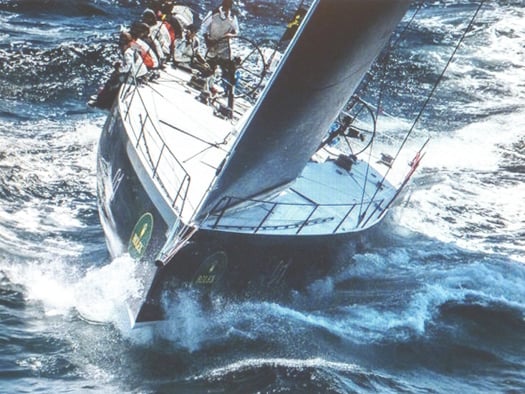
Matt Allen's Ichi Ban in the Rolex Sydney-Hobart Race of 2013, with Gordon Maguire as sailing master. To some observers, the very new Carkeek 60 seemed distinctly plump in her hull form forward compared to her closest competitors
In late January 2014, attention focused on the Quantum Key West Regatta in the Florida Keys, where Irish Olympic sailor Peter O'Leary of Cork was on the strength of New York art dealer Marc Glimcher's completely new and very potent looking Ker 40 Catapult. The boat did the business afloat in Florida, but further business was done ashore, as Anthony O'Leary himself was in Key West to see if he could sign up Catapult to be the secret ingredient in Ireland's Commodore's Cup team, for which at that stage the only certainty was his own older Ker 39 Antix. There seemed to be agreement, but in the volatile world of international trading and snap decisions in which top modern sailing operates, there can be sudden reversals of fortune, and O'Leary later admitted that until Catapult was actually unloaded from a ship in Europe, he hadn't been a hundred per cent certain she'd show.
Key West had further Irish interest in that veteran skipper Piet Vroon's Ker 46 Tonnere de Breskens – a former Round Ireland Race winner – was another star in the show, but much was to happen in Irish sailing before the Round Ireland 2014 got under way in Wicklow on June 28th.
With March slowly showing signs of Spring, university racing came centre stage, and it was University College Dublin which came through on top to qualify as Ireland's representatives in the Student Yachting Worlds in France in October, the team led by Philip Doran.
Another team was emerging as the Irish Cruiser Racing Association (ICRA) announced that our Commodore's Cup squad would be Anthony O'Leary's Ker 39 Antix, Marc Glimcher's Catapult, and the Grand Soleil 43 Quokka chartered by Michael Boyd and Niall Dowling, with Anthony O'Leary as team captain. He in turn would be supported by the shore management team, for a very intense week of racing, of Barry Rose and Fintan Cairns, with Mike Broughton in what would prove to be the particularly onerous task of Team Meteorologist.
As 2014 was exactly midway between two Olympiads, top level international dinghy sailing to Olympic standards might have been expected to be on the back burner. But Ireland's Olympians were very much on track on the international scene, and busy with their own programmes which culminated in the ISAF Worlds in Santander where Olympic places in Rio de Janeiro for 2016 were secured by James Espey in the Laser, Ryan Seaton & Matt McGovern in the 49er, and Annalise Murphy in the Women's Laser Radial. All were of course also seen in other boat types from time to time, with Annalise in particular bringing some glamour to the growing class of foiling Moths in Ireland.
Annalise on the foiling Moth
Other top international women sailors had descended on Ireland in early June with the ISAF Women's Match Race Worlds at Crosshaven. It's very much a specialist sailing interest, but aspiring Irish woman sailors attracted to this discipline found that this successful regatta provided some very useful networking contacts and future crewing possibilities, while the racing itself saw Sweden's Anna Kjellberg of the Royal Gothenburg YC become the new champion after defeating Camilla Ulrikkeholm of Denmark in the final.
In an entirely different area of sailing and life afloat, the traditional boat scene had come early to life with the Baltimore Wooden Boat Festival at the end of May. In the Irish climate after a particularly damp Spring, it reflected great credit on those involved that there was such a good turnout, ranging from the Shannon Gandelows from Limerick recently returned from their historic visit to Venice, through the many restored classic yachts of the region, also including the lovely Shannon cutter Sally O'Keeffe from Kilrush, and going on into the restored traditional mackerel and lobster yawls which make West Cork their home.
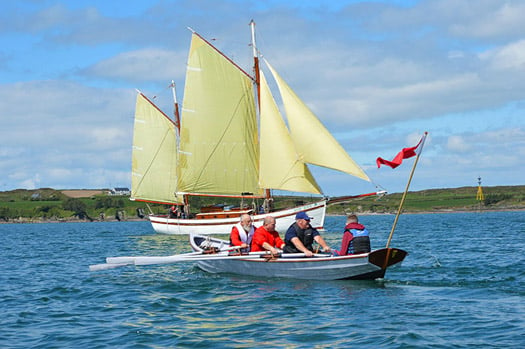
Shortly after their historic visit to Venice, the Shannon gandelows built by the Ilen School took part in the Baltimore Wooden Boat Festival at the end of May. The gandelow here, rowed by Liam O'Donghue, Anthony Kenny and Robert Samlle, is headed across Baltimore Harbour towards the gaff ketch Sile a Do.
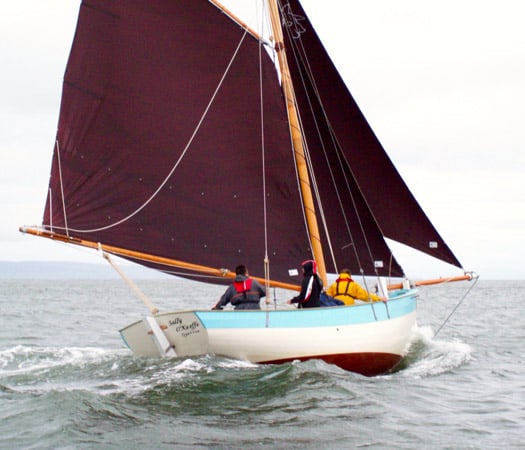
The pride of the Shannon Estuary - Sally O'Keeffe was built in a community effort in Querrin on the Loop Head peninsula.
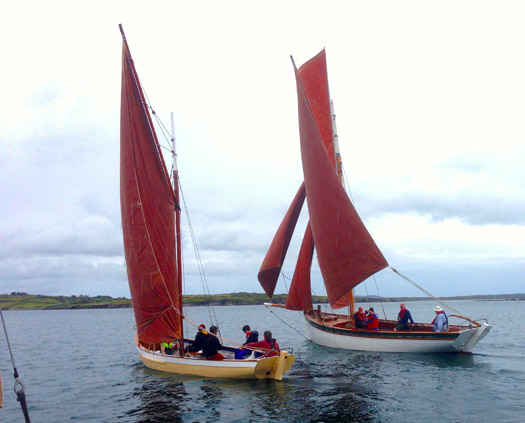
The traditional lobster boat Saoirse Muireann (left, Cormac Levis) and the mackerel yawl An tiscaire (Uilliam O'Lorcain) are a familiar sight in the waters of West Cork. Photo: Brian Marten
They were to re-appear in even greater numbers at the Ballydehob Gathering of the Boats in early August, a month during which the classic Galway Hookers of the West Coast were at their busiest on their home Atlantic waters, but the East Coast also had its moments with the Riverfest in Dublin's Liffey in early June seeing traditional and classic craft in a lively mix.
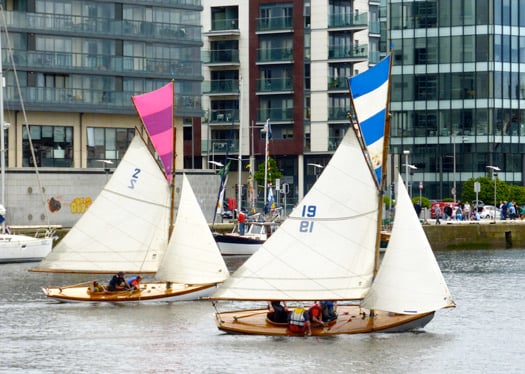
Sails in the City – two of the 1898 Howth Seventeens racing in the heart of Dublin in the Liffey Riverfest. Photo: W M Nixon
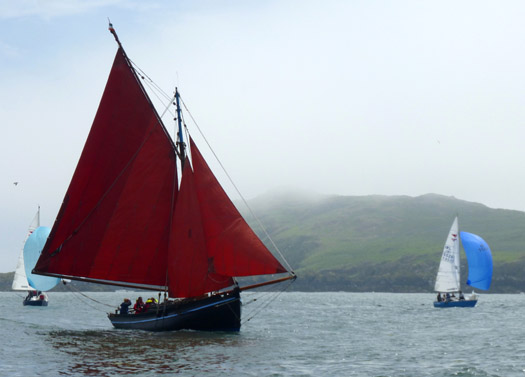
It could almost be Connemara, were it not for the Puppeteer 22s – the Galway Hooker Naomh Cronan in the new Classics & Traditional Division in Howth's annual Lambay Race, which was marking its 110th anniversary in 2014. Photo: W M Nixon
Indeed, so strong is the growing interest in classics and trads on the East Coast that to celebrate the centenary of the Lynch family's Howth 17 Echo (one of the newest of the class, the most senior ones were built in 1898) Howth YC provided a traditional Lambay Race course – simply up around Lambay and back to Howth Harbour – for the Seventeens and a new Classics Division, with the Howth 17s seeing the first two places taken by 1898 boats – Rita (John Curley & Marcus Lynch) and Aura (Ian Malcolm) – while Old Gaffers Association International president Sean Walsh won the classics with his Heard 28 Tir na nOg from the Clondalkin team's Galway Hooker Naomh Cronan. As for the overall prize among the large fleet of more modern boats sailing their more complex course, that was won by Colm Bermingham's Bite the Bullet.
The countdown to the Commodore's Cup had continued with inspirational performances by Anthony O'Leary in the Easter Challenge in the Solent, where he won his class with Antix, and then in June he did the same again with the British IRC Championship. Back home, ICRA held their Nationals with the Royal Irish YC in Dun Laoghaire in mid-June, and out of a fleet of a hundred plus boats it was the vintage Marcus Hutchinson/Rob Humphreys designed Quarter Tonner Quest (Jonathan Skerritt, RIYC) which was best overall scorer, a notably impressive performance also being put in by the Ker 36 Jump Juice (Denise Phelan) from Crosshaven.
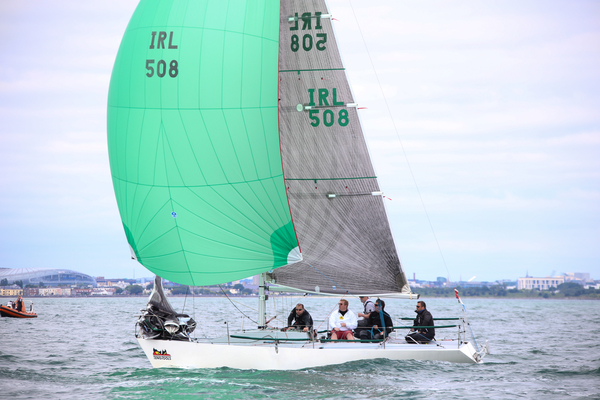
The 27-year-old Quarter Tonner Quest (Jonathan Skerritt) was overall winner in the ICRA Nats at the RIYC in Dun Laoghaire. Photo: David O'Brien

Downhill battle at the ICRA Nats with the Mills 36 Raptor (ex-Aztec) in foreground, while beyond is Peter Dunlop of Pwllheli's J/109 Mojito against the XP33 Bon Exemple (Colin Byrne, RIYC). Photo: Davd O'Brien
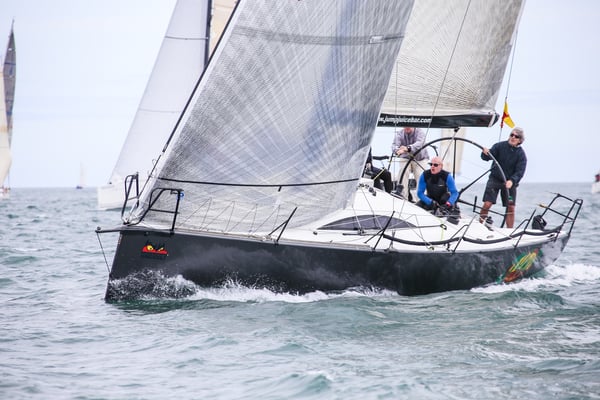
The Ker 36 Jump Juice (Denise Phelan) dominated Class 0 at the ICRA Nats. Photo: David O'Brien
The end of June, and it was Round Ireland time. Thirty-six boats started from Wicklow, 33 finished in a race which was mostly on the slow side, with mid-size boats having their day. The winner was Richard Harris's Sydney 36 Tanit from Scotland by just six minutes from the home favourite, Liam Shanahan's J/109 Ruth from the NYC in Dun Laoghaire. The French defending champion, Laurent Gouy's Ker 39 Inis Mor which sails in Ireland under the burgee of Clifden Boat Club, placed third while Frank Doyle of Cork, second generation round Ireland aristocracy as son of Denis of Moonduster fame, was fourth with his A35 Endgame.
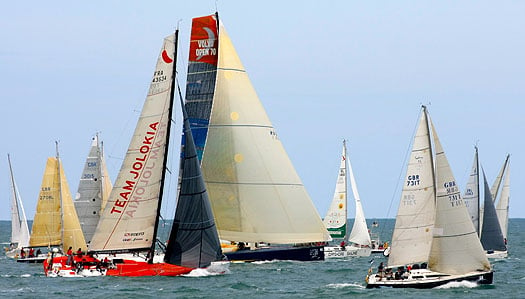
The start of the Round Ireland Race 2014 well illustrates the eclectic nature of the fleet. In right foreground is Richard Harris's Sydney 36 Tanit which was overall winner by just six minutes from the J/109 Ruth (Liam Shanahan), just beyond with the black jib, while the Volvo 70 Monster Project (David Ryan) comes thundering through the fleet at the beginning of a performance whch would see her take line honours win and thd class win in the CK Div.. Photo: Kevin Tracey
The same weekend as the Round Ireland race started, Lough Foyle sent the Clipper Fleet on their way after a week's festivities in Derry/Londonderry, made even more festive by the fact that Sean McCarter and his crew with the home town's boat had crowned their win in the Sydney-Hobart race with victory in the Transatlantic leg to Derry.
Clipper fleet in Derry
Crosshaven fairly leaped to life with Cork Week in July, and after several hitches in various boat-shipping plans, it was notable as the first time the Irish Commodore's Cup Team 2014 were seen together, and mighty impressive they looked too, with Quokka proving best on the Cork Week leaderboard.
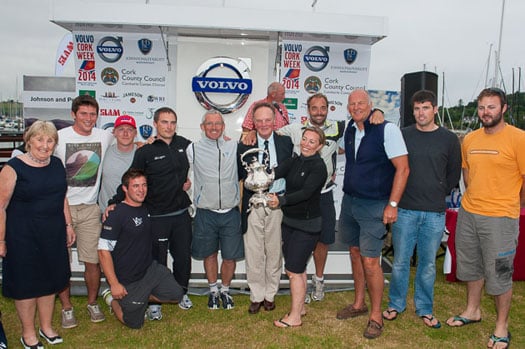
Michael Boyd (centre behind cup) and his Quokka crew, a member of Ireland's Commodore's Cup team, were overall winners of Cork week 2014. Photo: Bob Bateman
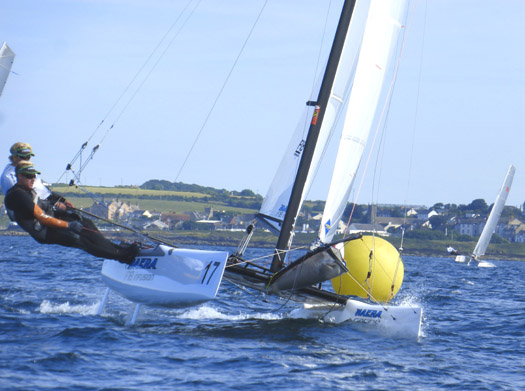
In the F18 Worlds at Ballyholme, Dutch skipper Gunnar Larssen (crewed by Ferdinand van West) is seen here putting in the smooth performance which saw him winning the worlds at his thirteenth attempt. Photo: W M Nixon
While all this excitement in racing boats with lids was building on the south coast in July, up north on Belfast Lough at Ballyholme the F18 Worlds were held for one of global sailing's most popular catamaran classes. Though the entry of 56 boats didn't match the 150-plus entries they get when the class has its worlds in its Mediterranean heartlands, the sailing was good and a popular winner emerged in longtime F18 sailor Gunnar Larsen, who is Dutch despite his Scandinavian name.
Dinghy attention was also very closely focused on Dublin Bay, with an enormous fleet of Optimists at the Europeans hosted by Royal St George YC from 12th to 20th July, and Dun Laoghaire really showing what it can do in being a major international regatta centre. France's Enzo Balanger was tops from Sweden's Kasper Nordenram, while best of the Irish in the Gold Division was Royal Cork's James McCann in tenth – not surprisingly, he was to go on to win the Nationals at his home club in August.
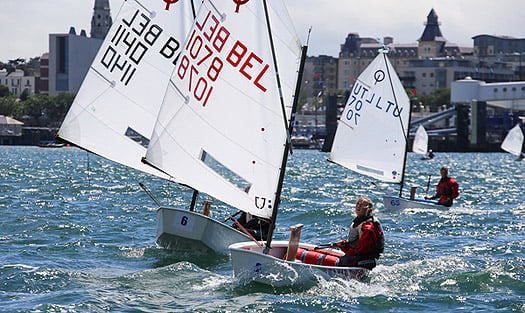
Nations from across Europe and beyond were at the Optimist Euros at Dun Laoghaire
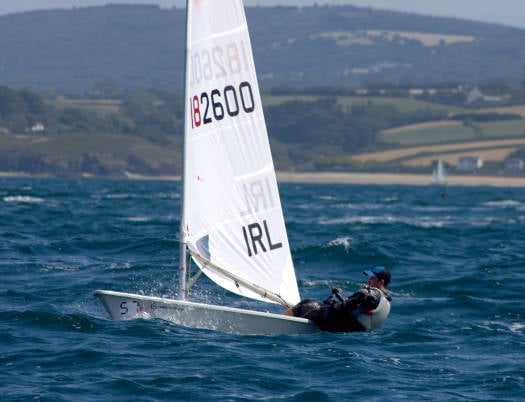
Finn Lynch racing at Douarnenez in France where be became the new U19 Laser Standard world championPhoto: Trevor Millar/Sail Coach
On the broader international scene, former Opty stars Finn Lynch (National YC) and Seafra Guifoyle (Royal Cork) were to turn in outstanding results during 2014, with Guilfoyle firmly in the frame through the ISAF Youth Worlds in the Laser, eventually coming home from Tavira in Portugal with the Silver, while Finn Lynch was on top form to clinch the Gold in the Under 19 Laser Standard Worlds at Douarnenez in Brittany.
Back aboard the boats with lids, late July had brought the Commodore's Cup in the Solent, and if anyone out there doesn't know who won, we'd like to hear from them, as the state of total seclusion which this implies is surely something which could be packaged and marketed to our hyper-informed and over-crowded world. The comprehensive Irish victory just seems better and better with the passage of time, and for Anthony O'Leary it was the highlight of a fantastic season which in September was to see him win the Helmsman's Championship of Ireland (admittedly by just a whisker) in J/80s in Howth to set up a national double for Royal Cork, as young Harry Durcan of Crosshaven was winner of the Junior Helmsmans. O'Leary meanwhile went on to win the 1720 Nationals in Baltimore later that month, and then in November his beloved Antix was named RORC Yacht of the Year.
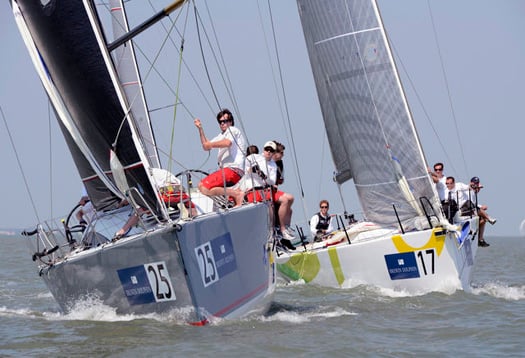
Antix in the Commodore's Cup, hanging in well coming to the weather mark to stay ahead of the newer Ker 40 Cutting Edge. Photo: Rick Tomlinson)
Even as Antix and her team mates were racing on towards glory in the Solent, in Clew Bay the West of Ireland Offshore Racing Association (WIORA) were staging their annual championship at hospitable Mayo SC, and it saw a good spread of results, with the overall winner being Galway's Liam Burke with his Corby 25 Tribal, while the runner-up was the McGibneys' Dehler Optimum 101 Dis-a-Ray, which sails under the Foynes YC burgee, but her home port is Tarbert further west along the Shannon Estuary.
August was busy with events for enjoyment. Eighty boats raced in Calves Week in West Cork, which has now been compressed to a four day regatta which means, as one sage family man observed, that you can take a house in Schull for a week's holiday, and then just as the wife and kids are getting fed up with having the ould fella always about the place, doesn't he absolutely have to go off and spend the last four days of the holiday sailing with his mates? That one of the top boats was Colman Garvey's True Penance maybe says it all.
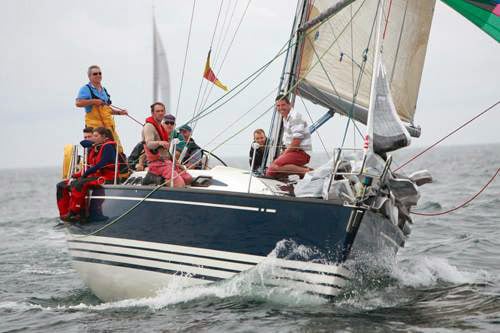
Calves Week 2014 entries were up 25% in 2014. Photo: Bob Bateman
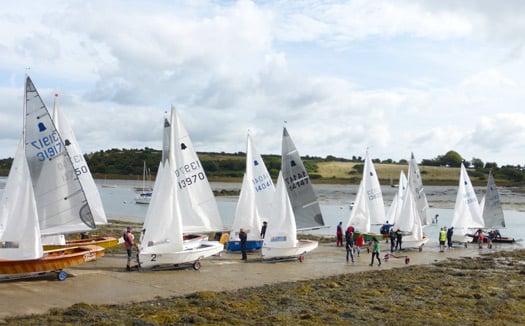
The GP14 Worlds at East Down YC in Strangford Lough launched a hundred boats every day in smooth style. Photo: W M Nixon
The biggest dinghy event of all (other than the Laser Nationals, which as ever are in a league of their own) was the GP 14 Worlds in mid-August at East Down YC in Strangford Lough, which had its excitement in a sudden storm on the Monday, but it all turned out okay. Boats involved were just over the hundred mark, the best boats were built in Northern Ireland by Alistair Duffin, and winners were English crew of Ian Dobson and Andy Tunnicliffe from Burwain, while top Irish were John and Donal McGuinness of Moville in Donegal, they were sixth.
At the other end of the intensity scale, down in Howth they had their first cruiser-racer two-hander for the Aqua Restaurant Challenge. Despite very restrained pre-publicity, it attracted 34 boats for a race round Lambay and the Kish. Stephen O'Flaherty's elegant Spirit 54 Soufriere, fresh from a win in the Panerai Classics in Cowes and co-sailed by David Cagney, took line honours and almost won, but the vintage Humphreys Half Tonner Harmony (Peter Freyne and Jonny Swann) just pipped them at the end.
Sailed in summery weather, the new Howth two-handed was about as different as possible from another two-handed experience in August, that of Liam Coyne (NYC) and Brin Flahive (Wicklow) in the 1800 mile RORC Seven Star Round Britain and Ireland. They didn't have to be two-handed, there were fully crew boats involved including the 70ft–trimaran Musandam in which Ireland's Damian Foxall played a leading role in taking line honours in record time, but aboard the First 36.7 Lula Belle the Irish duo just toughed it out despite sailing the last 500 miles with virtually nothing functional, they simply decided to see it through, and to their amazement found they'd won Classes V & VI.
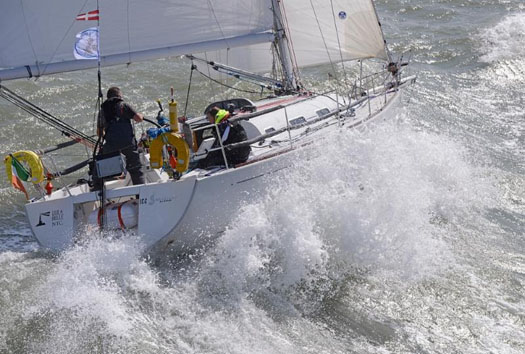
Lula Belle on her way out of the Solent with 1800 miles to race. Photo: Rick Tomlinson
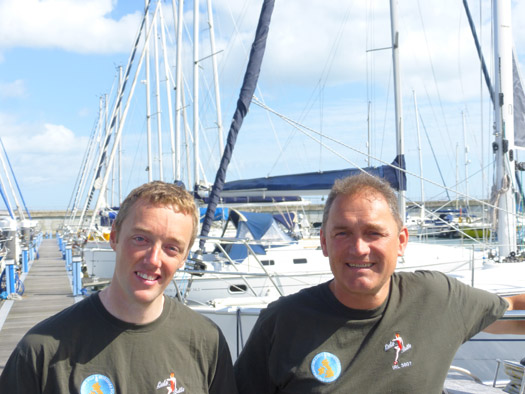
Brian Flahive & Liam Coyne back in Dun Laoghaire on the morning of their return from the finish of the Round Britain & Ireland Race. Photo: W M Nixon
As for the Laser Nats, they were at the end of August and another Ballyholme event, with Johnny Durcan of Royal Cork winning from Rory Fekkes of the home club, while the radials saw Annalise Murphy keep her hand in with a win from Cork's Cian Byrne.
After some rugged August weather, particularly on Ireland's East Coast, September was utterly blissful and it sweetly rounded out Dublin Bay Sailing Club's 130th season, the birthday being marked by a fairly epic dinner in the National YC. September also saw the conclusion of the slowly but steadily reviving Irish Sea Offshore Racing programme, with the end-of-season race from Pwllheli to Dun Laoghaire seeing Liam Shanahan's J/109 Ruth confirmed as the overall winner of the series. Among locally campaigned dinghies, meanwhile, Dun Laoghaire's keen Fireball Class kept its annual programme in lively shape, and the season drew a close with Barry McCartin and Conor Kinsella winning overall from Noel Butler and Stephen Oram.
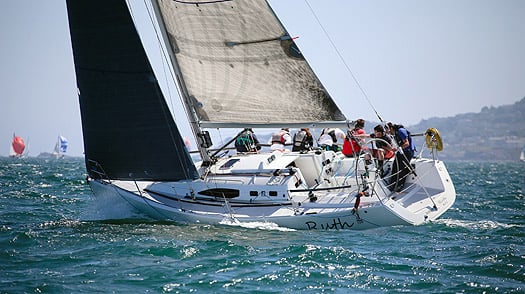
ISORA Champion Ruth skippered by Liam Shanahan jnr from the National Yacht Club
Across country in Limerick, the CityOne dinghies and the traditional Shannon gandelows created in projects of the Ilen Boatbuilding School made their debut in the city centre on one of the last days of the Indian summer, and then they were put on display in a Naumachia in St Mary's Cathedral which was officially opened by Michael Noonan TD, and later formally visited by President Higgins.
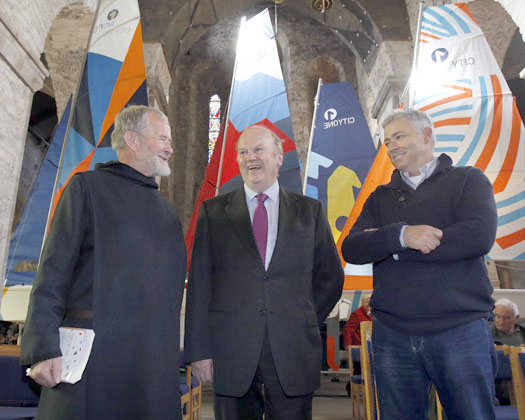
The hopeful new spirit of Irish sailing in 2014 was evident in St Mary's Cathedral in Limerick, when the CityOne dinghies built by volunteers in an inner city revitalisation project went on display in a Naumachia in the Cathedral on September 26th, after their first regatta on the Shannon in the heart of Ireland's City of Culture 2014. With the boats in the cathedral were (left) Brother Anthony Keane of Glenstal Abbey (Director, the Ilen School), Limerick's senior TD and Ireland's Minister for Finance Michael Noonan, and Gary MacMahon (right) Director of the Ilen School & Network for Wooden Boatbuilding. Photo: Press22
And then more vigorous winds returned in October, with the Freshwater Keelboat event on Lough Derg – originally just an exclusive Dragon thing – finding itself swamped with sixty and more boats from five classes and increasingly rugged conditions, such that only the Dragons and Squibs managed to get in any meaningful racing, with Neil Hegarty (RStGYC) winning the Dragons while James Matthews and Rob Jacob of Kinsale topped the Squibs.
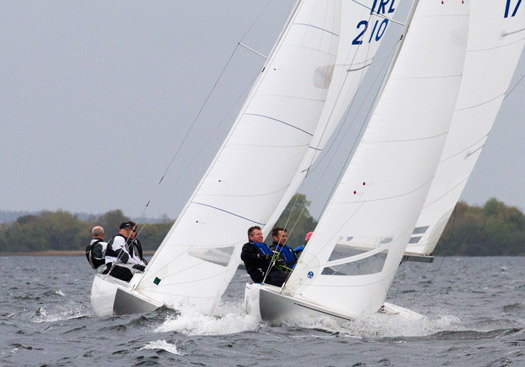
Dragons in Autumn action on Lough Derg – Neil Hegarty (right) was overall winner from runner-up Richard Goodbody (left) Photo: Gareth Craig
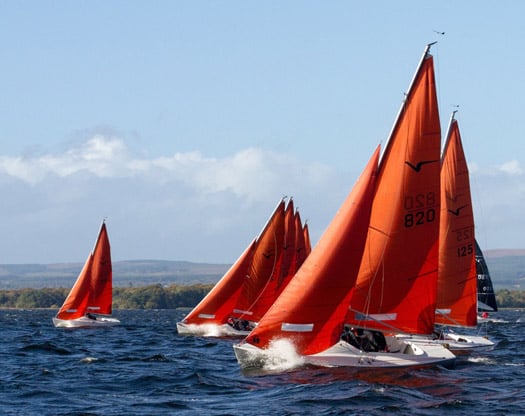
Squibs on Lough Derg – it may look like perfect sailing, but the top came off the weather very soon afterwads. Photo: Gareth Craig
The Student Yachting Worlds in La Rochelle in October had some hiccups in UCD's campaign for Ireland, but while they very narrowly missed the podium in a truly international event, they stayed put at fourth overall. And round in the Mediterranean, a record fleet for the Rolex Middle Sea Race from Malta saw entries soar through the 120 mark for the first time, and the 606 mile race had its first half in light breezes, but the second half was in pure Mistral, with people talking of "winds easing to 44 knots....." A Maltese-owned J/122 won, but second overall and first in her class was the Xp44 XpAct (Josef Schultheis) with a strong Irish emphasis in her crew including Barry Hurley, Andy Boyle, Kenny Rumball and Phillip Connor.
Soon afterwards, the Volvo World Race got under way with first stage from the Med to Cape Town, and Ireland's Justin Slattery on the winning boat on Leg 1. Back home, Autumn leagues had seen renewed enthusiasm as though people had suddenly re-discovered their sport, and the great sailing year of 2014 drew towards its close with the Lasers in Howth starting their 40th winter of annual frostbite racing. This means that HYC have now had a continuous sailing programme since April 1974, while across in Dun Laoghaire the DMYC Frostbite Series must be the most senior of all winter events. Winter Leagues attract more aficionados, with the popularity of the Dublin Bay Turkey Shoot in particular providing a forceful reminder that Dun Laoghaire is the principal sea access for a notably affluent and very large population in South Dublin. With the Turkey on its way, soon it's Christmas. And then the new Irish sailing season will begin on the blue waters of Sydney Harbour.
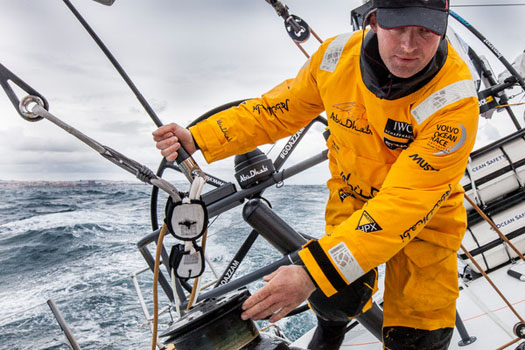
Justin Slattery on Volvo World Race 2014. Photo: Volvo Ocean Race


























